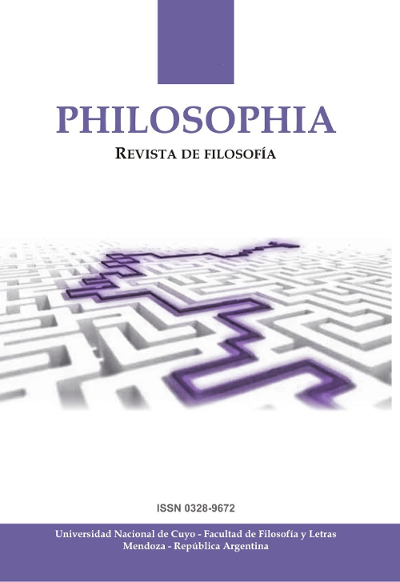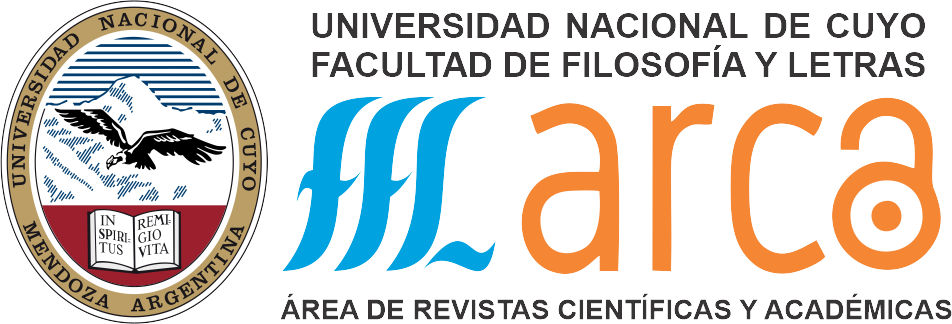Ignorance of self as a soul’s disease and the gnostic’s specular word as therapy in Evagrius Ponticus
DOI:
https://doi.org/10.48162/rev.50.004Keywords:
Evagrius Ponticus, Ignorance, Word, GnosticAbstract
Evagrius Ponticus, following an ancient and late-ancient tradition of thought, confers on the word a therapeutic power rooted in a profound conception of the disease of the soul. The present work show that in the Ponticus' work there is a recognition of the healing virtue of the word and a consequent proposal for the therapeutic exercise of that word. This proposal stems from a conception about self-ignorance as the disease of the soul. That therapeutic exercise is embodied and specified in the figure of the Gnostic. The Gnostic has traveled a spiritual itinerary at the end of which he has obtained science. By virtue of this he can carry out (in imitation of the divine physician) a medicinal ministry to sick souls and variously afflicted by passions.
References
Alby, Juan Carlos. “La asthéneia en la antropología cristiana primitiva.” Scripta Mediaevalia 4:1 (2011): 11-26.
Bunge, Gabriel. “Notas.” En Praktikos oder der Mönch, Evagrios Pontikos. Köln: Luthe-Verlag, 1989.
Dysinger, Luke (2004). “Healing Judgment: ‘Medical Hermeneutics’ in the Writing of Evagrius Ponticus.” En Il monachesimo tra eredità e aperture: atti del simposio "Testi e temi nella tradizione del monachesimo cristiano", editado por M. Bielawski y D. Hombergen, 75-104. Roma: Pontificio ateneo S. Anselmo, 2004.
Dysinger, Luke. “An Exegetical Way of Seeing: Contemplation and Spiritual Guidance in Evagrius Ponticus.” Studia Patristica 57 (2013): 31-50.
Dysinger, Luke. “Exegesis and Spiritual Guidance in Evagrius Ponticus.” Studia Patristica 47 (2010): 209–22.
Dysinger, Luke. Psalmody and Prayer in the Writings of Evagrius Ponticus. Oxford-New York: Oxford University Press, 2005.
Evagrio Póntico. A los monjes. En Obras espirituales. Introducción, traducción y notas de José I. González Villanueva y Juan Pablo Rubio Sadia, 177-211. Madrid: Ciudad Nueva, 1995.
Evagrio Póntico. Carta 55. En “St. Evagrius Ponticus (345–399). Selected Letters”, Monastic Spirituality Self-Study (Website), ed. Luke Dysinger. http://www.ldysinger.com/Evagrius/11_Letters/00a_start.htm (Consultado el 22-02-2021).
Evagrio Póntico. Chapitres des disciples d’Évagre. Introducción, traducción y notas de Paul Géhin, Sources Chrétiennes 514. Paris: Cerf, 2007.
Evagrio Póntico. Contro i pensieri malvagi. Antirrhetikos. Introducción de Gabriel Bunge, traducción y notas de Valerio Lazzeri. Magnano: Qiqajon, 2005.
Evagrio Póntico. Escolios a los salmos. En “St. Evagrius Ponticus (345– 399). Selected Scholia on Psalms”, Monastic Spirituality Self-Study (Website), ed. Luke Dysinger. http://www.ldysinger.com/Evagrius/08_Psalms/00a_start.htm (Consultado el 22-02-2021).
Evagrio Póntico. Evagrius's Kephalaia Gnostica: A New Translation of the Unreformed Text from the Syriac. Introducción, traducción y notas de Illaria Ramelli, Writings from the Greco-Roman World. Atlanta: SBL Press, 2015.
Evagrio Póntico. Gli otto spiriti della malvagità. Introducción, traducción y notas de Francesca Moscatelli. Milano: San Paolo, 2006.
Evagrio Póntico. Le gnostique ou a calui qui est devenu digne de la science. Introducción, traducción y notas de Antoine Guillaumont y Claire Guillaumont, Sources Chrétiennes 356. Paris: Cerf, 1989/2008.
Evagrio Póntico. Les six centuries des ‘Kephalaia gnostica’ d’Évagre le Pontique. Traducción de Antoine Guillaumont, Patrologia Orientalis T. XXVIII, fascicule 1, Paris: Brepols, 1985.
Evagrio Póntico. Scholies à l'Ecclésiaste. Introducción, traducción y notas de Paul Géhin, Sources Chrétiennes 397. Paris: Cerf, 1993.
Evagrio Póntico. Scholies aux Proverbes. Introducción, traducción y notas de Paul Géhin, Sources Chrétiennes 340. Paris: Cerf, 1987.
Evagrio Póntico. Skemmata. Introducción, traducción y notas de William Harmless y And Raymond R. Fitzgerald. En “The sapphire light of the mind: the Skemmata of Evagrius Ponticus.” Theological Studies 62 (2001): 498-529.
Evagrio Póntico. Sobre la Oración. En Obras espirituales. Introducción, traducción y notas de José I. González Villanueva y Juan Pablo Rubio Sadia, 229-275. Madrid: Ciudad Nueva, 1995.
Evagrio Póntico. Sur les pensées. Introducción, traducción y notas de Paul Géhin, Claire Guillaumont y Antoine Guillaumont, Sources Chrétiennes 438. Paris: Cerf, 1998.
Evagrio Póntico. Traité Pratique ou le moine. Introducción, traducción y notas de Antoine Guillaumont y Claire Guillaumont, Sources Chrétiennes 171. Paris: Cerf, 1971.
Forthomme, Bernard. De l’acédie monastique à l’anxio-depression. Histoire philosophique de la transformation d’un vice en pathologie. París: Synthélabo, 2000.
Forthomme, Bernard. L’expérience de la guérison. Paris: Les Empêcheurs de penser en rond. 2002.
Géhin, Paul. “Introduction.” En: Chapitres des disciples d’Évagre, Evagrio Póntico. Ed. P. Géhin, 19-98. Paris: Cerf, 2007.
Géhin, Paul; Guillaumont, Claire y Guillaumont, Antoine. “Introduction.” En: Sur les pensées, eds. Géhin y Guillaumont, 9-136. Paris: Cerf, 1998.
Guillaumont, Antoine. Un philosophe au désert. Évagre le Pontique. Paris: Vrin, 2009.
Kalvesmaki, Joel. Guide to Evagrius Ponticus, 2021 edition. Washington, DC, 2021. http://evagriusponticus.net (Consultado el 25-06-2021).
Konstantinovsky, Julia “Evagrius Ponticus on Being Good in God and Christ.” Studies in Christian Ethics 26 (2013): 317–332.
Konstantinovsky, Julia. “Evagrius Ponticus and Maximus the Confessor The building of the Self in Praxis and Contemplation.” En Evagrius and His Legacy, eds. J. Kalvesmaki y R. D. Young, 128-153. South Bend: University of Notre Dame Press, 2016.
Konstantinovsky, Julia. Evagrius Ponticus. The Making of a Gnostic. Farnham: Ashgate, 2009.
Peretó Rivas, Rubén. “Conocimiento e ignorancia en Evagrio Póntico.” Cauriensia IX (2014): 75-93.
Peretó Rivas, Rubén. “Las mutaciones de la acedia. De la Patrística a la Edad Media.” Studium. Filosofía y Teología 27 (2011): 157-171.
Pesthy, Monika. “Logismoí Origéniens – Logismoí Évagriens.” En: Origeniana Octava, eds. Lorenzo Perrone, P. Bernardino y D. Marchini, 1017-1022. Leuven: Leuven University Press / Peeters, 2003.
Tobon, Monica. Apatheia in the Teachings of Evagrius Ponticus. Th. D. London: University College, 2010.
Tobon, Monica. “Evagrius as Writer: The Example of Eulogios 2's Discussion of Xeniteia.” En Origeniana decima: Origen as writer: papers of the 10th International Origen Congress, University School of Philosophy and Education Ignatianum, eds. Kaczmarek, S., Dziadowiec, A. y Pietras, H., 765-778. Leuven: Peeters, 2011.
Vazquez, Santiago. “El Abba como Gnóstico en Evagrio Póntico: El rol pedagógico-medicinal de su palabra y sus fuentes.” Studia Monastica 59/2 (2017): 251-268.
Vazquez, Santiago. “El gnóstico y la capacidad confutatoria de la palabra como recurso de la labor medicinal en Evagrio Póntico.” Ágora. Papeles de Filosofía 39/2 (2020): 59-78.
Vazquez, Santiago. “La enfermedad del alma en el filósofo tardoantiguo Evagrio Póntico: entre ignorancia y filautía.” Anales del seminario de historia de la filosofía, 35/2 (2018): 323-343.
Vazquez, Santiago. “La noción de logismoí en Evagrio Póntico: el correlato cognitivo de las pasiones enfermas.” ÉNDOXA: Series Filosóficas 43 (2019): 67-90.
Vazquez, Santiago. “La palabra como medio por el cual el gnóstico ejerce una acción medicinal en Evagrio Póntico.” Ideas y Valores 70/176 (2021): 75-94.
Vazquez, Santiago. “La palabra y su dimensión terapéutica frente a la enfermedad del alma en Evagrio Póntico.” Rivista di storia e letteratura religiosa LIII/1 (2017): 3-31.
Vazquez, Santiago. “Terapéutica del alma en Evagrio Póntico: la acción curativa del gnóstico a la luz de la intervención angélica.” Carthaginensia 35/68 (2019): 511-535.
Published
How to Cite
Issue
Section
License
Copyright (c) 2021 Philosophia

This work is licensed under a Creative Commons Attribution-NonCommercial-ShareAlike 3.0 Unported License.
Se permite la reproducción de los artículos siempre y cuando se cite la fuente. This work is protected under license Attribution-NonCommercial-ShareAlike 3.0 Unported (CC BY-NC-SA 3.0) You are free to: Share "” copy and redistribute the material in any medium or format; Adapt "” remix, transform, and build upon the material
The licensor cannot revoke these freedoms as long as you follow the license terms.
Under the following terms:
Attribution "” You must give appropriate credit, provide a link to the license, and indicate if changes were made. You may do so in any reasonable manner, but not in any way that suggests the licensor endorses you or your use.
NonCommercial "” You may not use the material for commercial purposes.
ShareAlike "” If you remix, transform, or build upon the material, you must distribute your contributions under the same license as the original.
No additional restrictions "” You may not apply legal terms or technological measures that legally restrict others from doing anything the license permits.
For more information, please visit: https://creativecommons.org/licenses/by-nc-sa/3.0/deed.en






